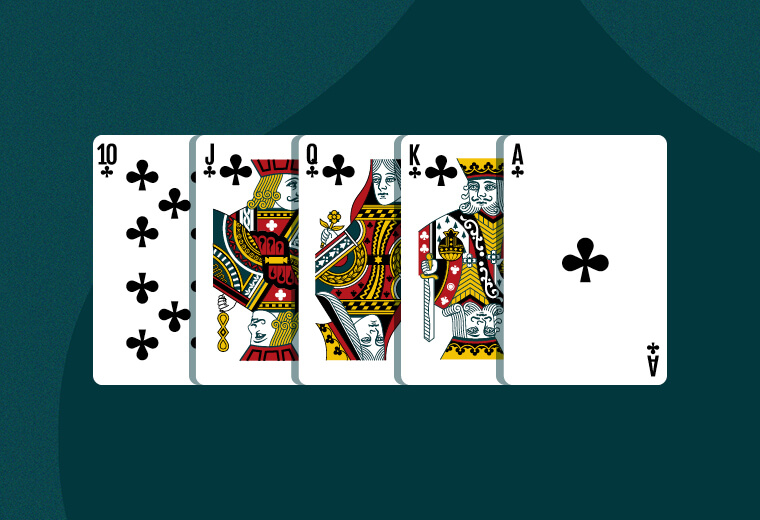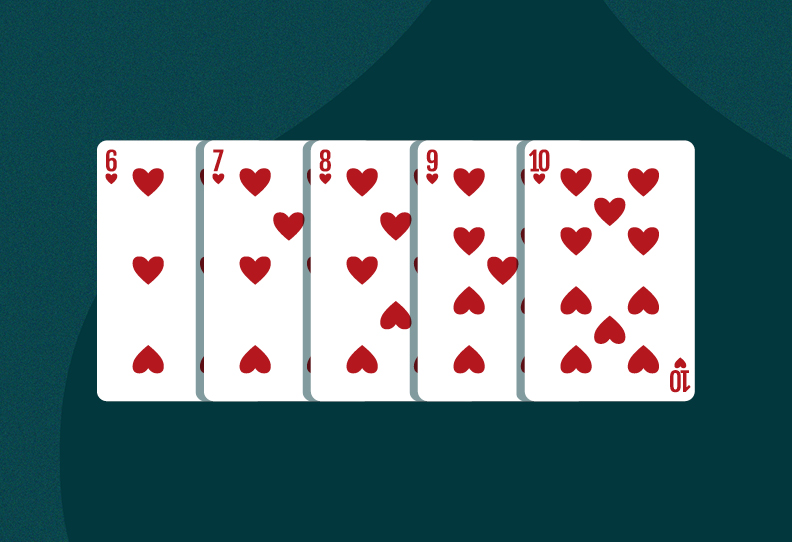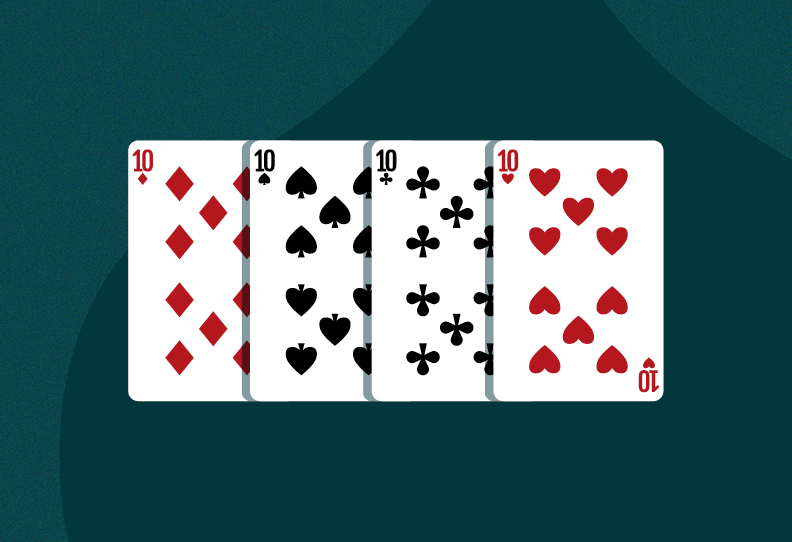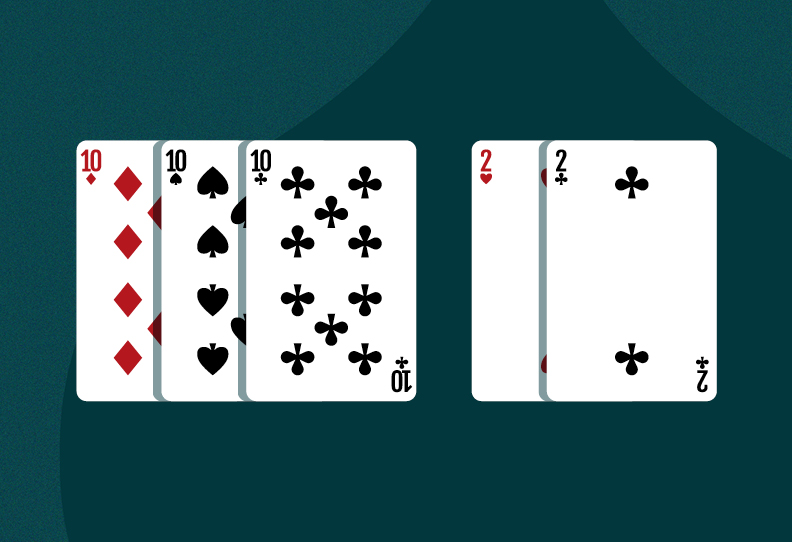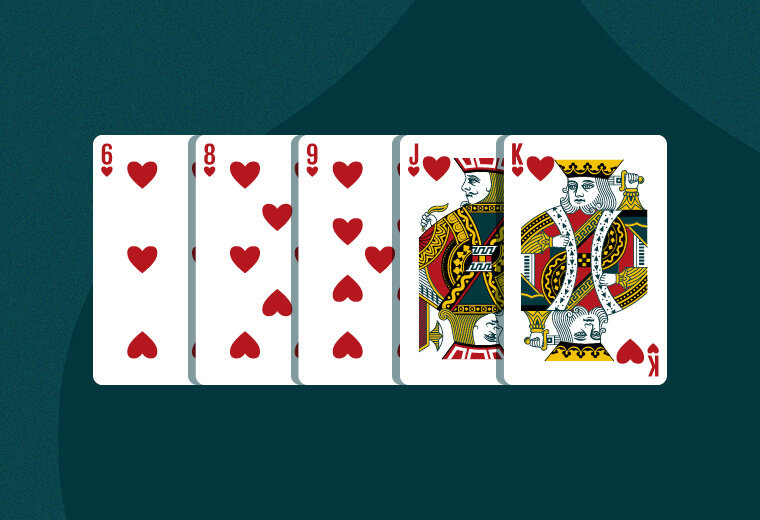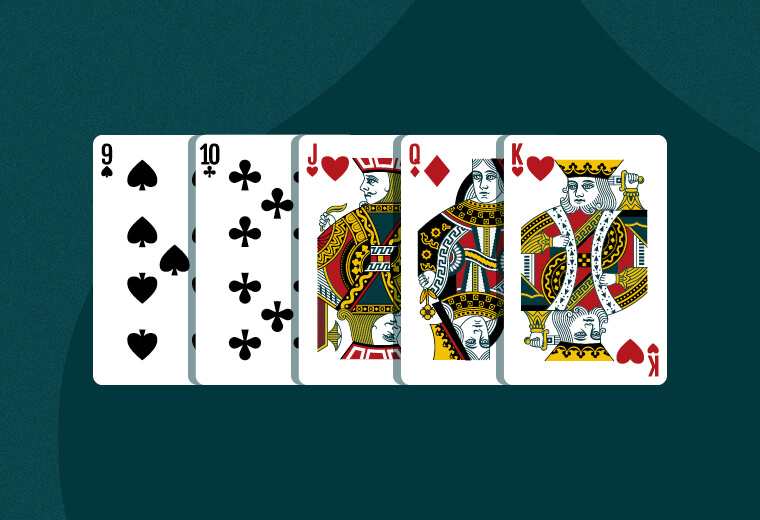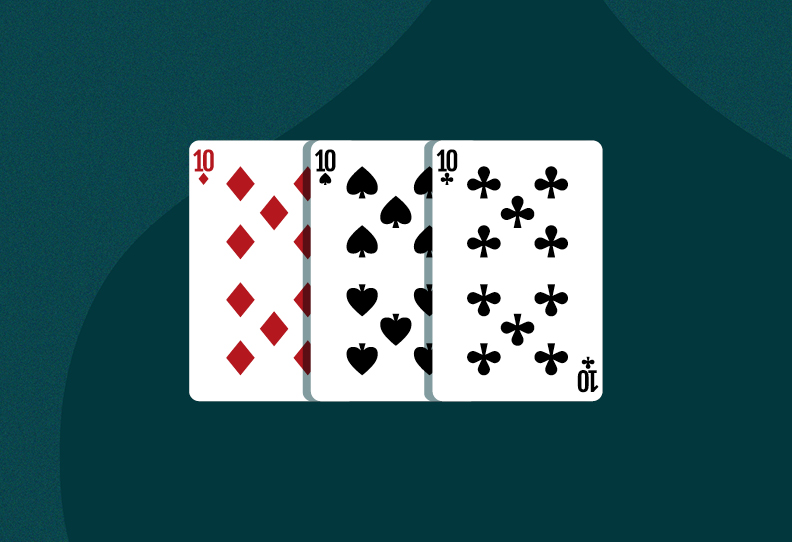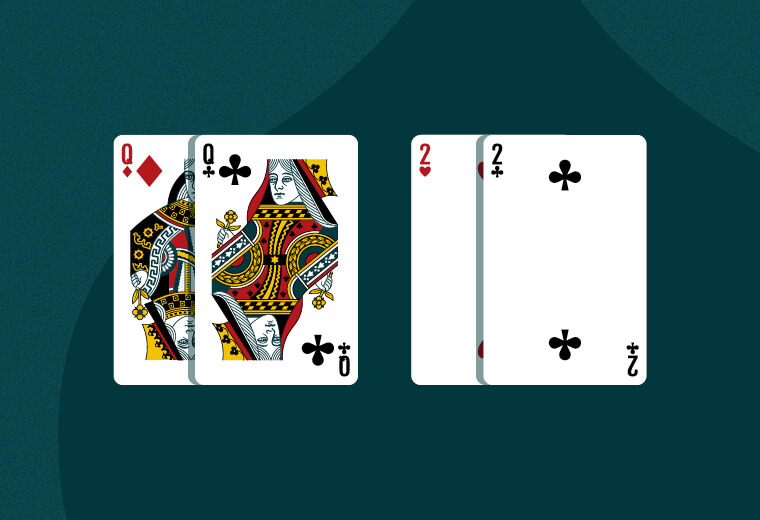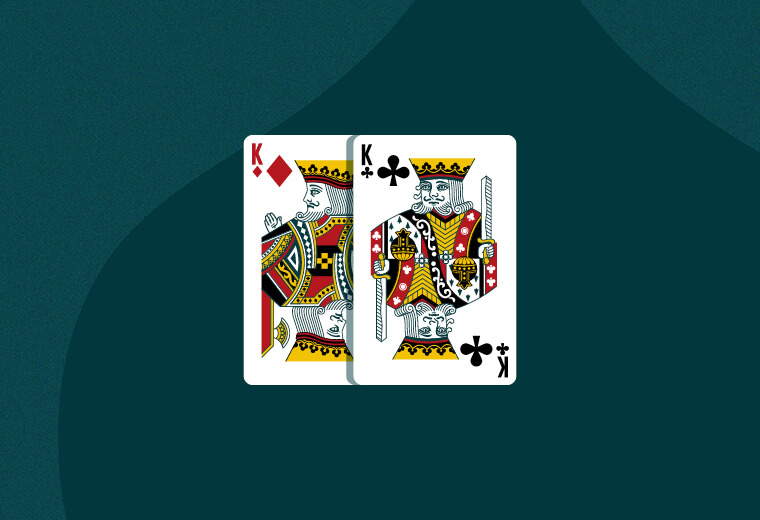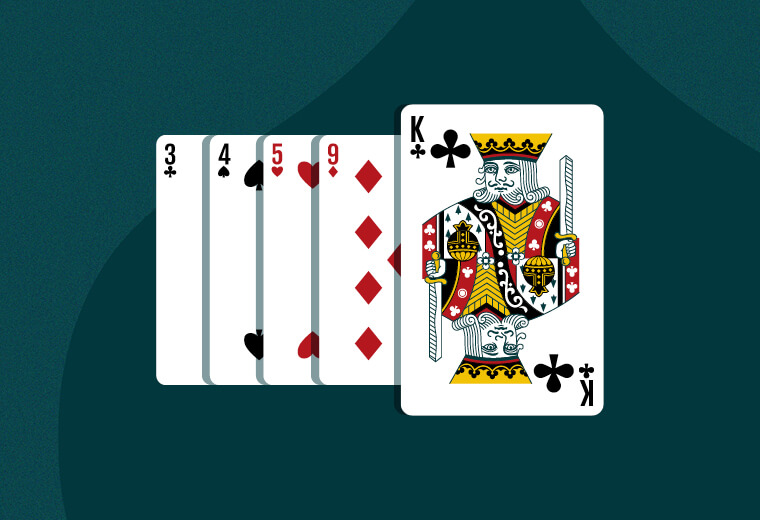Poker
Poker comes in various forms. A rough distinction is made between three different categories of card poker. Hold’em is a variant played with community cards. In addition to Texas Hold’em, the most popular poker variant, Omaha Hold’em also falls into this category.
In a cash game, you can join a poker round at any time and leave the game again. When you leave the game, the chips you have at that time will be paid out.
In a tournament, you play until one player owns all the chips. The top-ranked players receive the collected buy-ins as prize money, which is individually staggered.

The goal: The best poker hand at the table
Objective
The aim of the poker game is to have the best poker hand and to make certain combinations from the available cards.
Gameplay
In poker, you play together with up to nine other guests in four rounds for the collected stake (pot). The game is supervised by the dealer (croupier), who also leads the game. At each table, the dealer button, which is passed on clockwise, marks the respective (fictitious) card dealer. This gives each player the strategic positional advantage of being the last to speak in the round.
Video game instructions
Initial Deal
The two players sitting clockwise next to the dealer button place the small blind and the big blind, respectively.
Initial Deal
As the initial deal, the dealer deals each player two (TEXAS) or four (OMAHA) face-down cards (hole cards), starting with the first player after the dealer button.
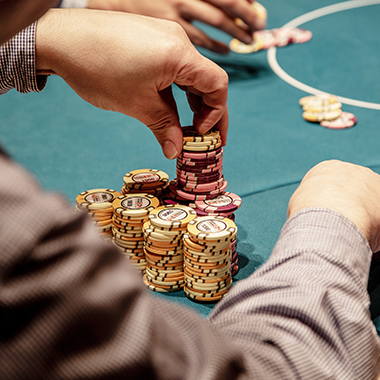
Round 1
The player after the big blind speaks first. They can fold, bring the bet up to the amount of the big blind, or raise within the valid limit.
All subsequent players have the same options. If you are a small blind player, you must bring the difference to the highest bet in order to stay in the game.
The big blind player can also raise the bet again. Any increase in the bet during a round must also be borne by all subsequent players.
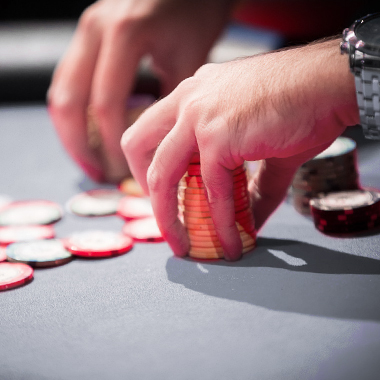
Round 2
After the first betting round, the dealer places three open cards (flop) in the middle of the table. From these three cards and your two hole cards, you can mentally put together a possible hand. Now another betting round begins.
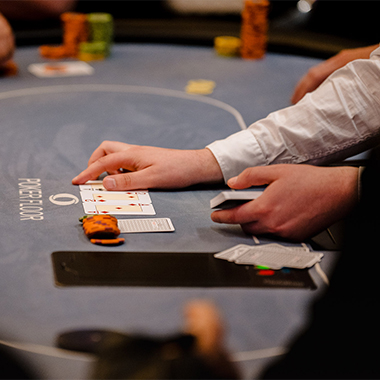
Round 3
After the dealer has placed another card (turn) face up in the middle of the table, put together your best possible hand (five cards) and participate in the next betting round if you wish.
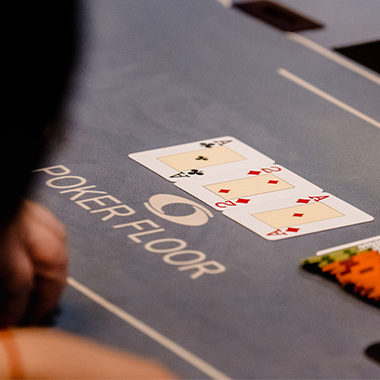
Round 4
Before the final betting round, the dealer places the last open card (river) on the table. At the end, your best hand results from the five board cards and your two hole cards. You can also win without the best hand if your fellow players give up early (fold).
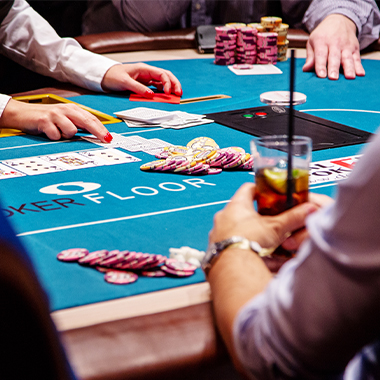
Showdown
The player who made the last bet or raise begins the showdown. The dealer decides, taking into account the hole cards of each active player and the community cards, which hand has won.
To determine the best hand, each still active player must select the best five-card combination that can be created from their hole cards and the five community cards (the board).
In Texas Hold’em, it doesn’t matter whether he uses three, four, or all five board cards to do so. In Omaha, on the other hand, he must use two of his hole cards and three board cards.
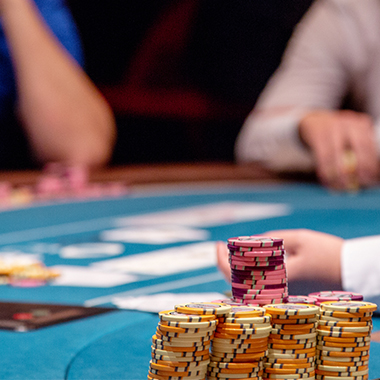
Winning Combinations
Level
Poker tournaments are also well-suited for beginners, as the one-time buy-in is easy to calculate in advance. For cash games, prior knowledge is recommended.
Bets
In tournaments, the buy-in is paid in advance. Spielbank Berlin offers daily tournaments with various buy-ins. In cash games, a fixed minimum amount is bet in each round, starting at €1.00, and this can be raised by individual players.
Payout
In tournaments, the top-placed players receive the collected buy-ins as prize money, which is distributed according to a specific structure. In cash games, players can cash out the chips they have when they leave the game.
FAQs / Glossary
In our poker glossary, you will find all the important poker terms and technical words listed and simply explained.
| All-in | "Everything is bet". Use of all chips available at the table by a player. |
| Ante | A small, required bet that each player must make before seeing the cards so that a pot is formed. In most Hold'em variants, there is no such ante; instead, the pot is formed here with "blinds". |
| Blind | The blinds in poker are mandatory bets that must be placed in the pot before cards are dealt. The amount of the blind bets is determined before the game and is usually referred to as the betting structure. |
| Big Blind | Fixed second bet before the cards are dealt. Mandatory bet that the player to the left of the small blind must pay. The big blind is the larger of the two prescribed bets that must be made in a Texas Hold'em game. The big blind is usually twice as high as the small blind. |
| Bluff | Deceiving the opponent with regard to the value of one's own cards. Betting or raising with a hand that is supposedly worse than that of your opponent with the intention of inducing them to fold their stronger hand. |
| Call (Mitgehen) | Announcement by the player to match the bet requested so far. The player puts the amount in the pot that corresponds to the last bet or raise. |
| Check | Announcement by the player, if no bet has yet been made, to stay in the game without a bet. The player does not bet, but can still call or raise in the further course of the betting round, which is equivalent to betting zero dollars. |
| Chip | American term for game token, also called piece or jeton. |
| Community Cards | These are the cards that are placed face up on the table in Texas Hold'em and Omaha and are used by all players at the same time. They are also referred to as the "board." |
| Dealer | Employee of Spielbank Berlin who deals the cards. |
| Dealer Button | Indicates and identifies which player is the "fictitious card dealer". The button moves one position further after each game. |
| Fold | Announcement by the player to drop out of the current game. |
| Flop | The first three cards that are placed face up in the middle of the table. These are the so-called "community cards" that can be used by all players to form a strong 5-card hand. |
| No Limit | A betting variant in poker in which a player, as soon as it is their turn, can raise by any amount that is in chips in front of them at that time. No Limit Poker is very complex and is regarded by many players as the "true" poker. |
| Pot | The sum of the bets made forms the pot for which poker is played. |
| Pot Limit | A betting variant in which the player who is on turn can raise up to the current maximum amount. Similar to No Limit Poker, Pot Limit Poker is very different from Limit Poker. |
| Raise (erhöhen) | Announcement by the player to increase the bet requested so far. |
| River | The fifth and final community card is the "river". |
| Small Blind | Fixed first bet before the cards are dealt. The mandatory bet that the player to the left of the dealer makes is called the small blind. The smaller of the two mandatory bets that are typical of Texas Hold'em. See also "Blinds" and "Big Blind." Generally, the small blind is one to two-thirds of a bet in the first betting round. |
| Showdown | End of the poker round. The cards must be placed face up on the table. Revealing the cards at the end of a game round. All players who are still in the game at this time turn over their cards (starting with the player to the left of the "dealer button") to determine the winner. However, if someone makes a bet or raise in the last betting round that no other opponent at the table matches, there will of course be no "showdown." |
| Tax | Fee charged by Spielbank Berlin. |
| Turn | The fourth community card. Is placed face up on the table. Also known as "Fourth Street." |
